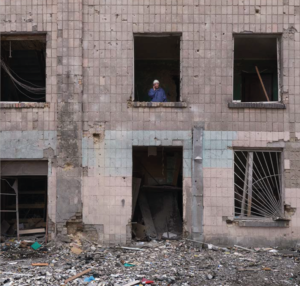CULTURE – “Ukraine”: photos by Rosselli on display at the Shoah Memorial in Milan
 The lives and landscapes are “offended by the war” but the desire and need to move forward still survive. In the shots by photographer Stefano Rosselli, you can find a portrait of Ukraine today, shattered by the Russian aggression, but at the same time busy with life. “The wish for normality leads people to seek, even where it seems impossible, moments of serenity, because, fortunately, life always prevails on death,” Rosselli explained. Over the past year and a half, the photographer has spent almost one hundred days in the war-torn country, capturing its contradictory normality. From those images, the exhibition “Ukraine” was born, curated by Maria Vittoria Baravelli and inaugurated at the Shoah Memorial of Milan.
The lives and landscapes are “offended by the war” but the desire and need to move forward still survive. In the shots by photographer Stefano Rosselli, you can find a portrait of Ukraine today, shattered by the Russian aggression, but at the same time busy with life. “The wish for normality leads people to seek, even where it seems impossible, moments of serenity, because, fortunately, life always prevails on death,” Rosselli explained. Over the past year and a half, the photographer has spent almost one hundred days in the war-torn country, capturing its contradictory normality. From those images, the exhibition “Ukraine” was born, curated by Maria Vittoria Baravelli and inaugurated at the Shoah Memorial of Milan.
As the president of the Memorial Roberto Jarach explained, it’s a place “to process the past, but also a laboratory of the present.” Hence the choice to shed light on Ukraine. “What happens in a war scenario?” This is the question at the heart of the exhibition, which, Jarach says, “takes us to a land that has sadly become a scene of clashes and pain and prompts us to question these themes.”
In one photograph, the Ukrainian soldiers look tense and determined while they are headed to the battlefront. In a second one, a grave is to be filled in the Bucha cemetery, and in a third one a shopping center in Kiev has been reduced to rubble by Russian missiles. But Rosselli’s shots also feature a group of young people smiling as they spend a summer day taking a bath in the Bug River, or the natural gesture of an unnamed mother focused on combing her son’s hair. “Does one show up disheveled to a meeting? No, especially if the meeting is with a dream, with a hope or with the future,” the curator Baravelli points out.
The exhibition “Ukraine,” a transposition of the homonymous volume published by Feltrinelli, will remain open until January 7. Music composed by Ferdinando Arnò with lyrics by Massimo Recalcati will accompany the public through the exhibition itinerary. “An undetonated missile is stuck in a field while in the background a man with a sickle seems to be heading to work. War – Recalcati explains – does not completely cancel the ordinary rhythm of life: in fact, surviving is the most proper job of human beings.”
Translated by Klara Mattiussi, revised by Annadora Zuanel, students at the Secondary School of Modern Languages for Interpreters and Translators of the University of Trieste, interns at the newspaper office of the Union of the Italian Jewish Communities – Pagine Ebraiche.
